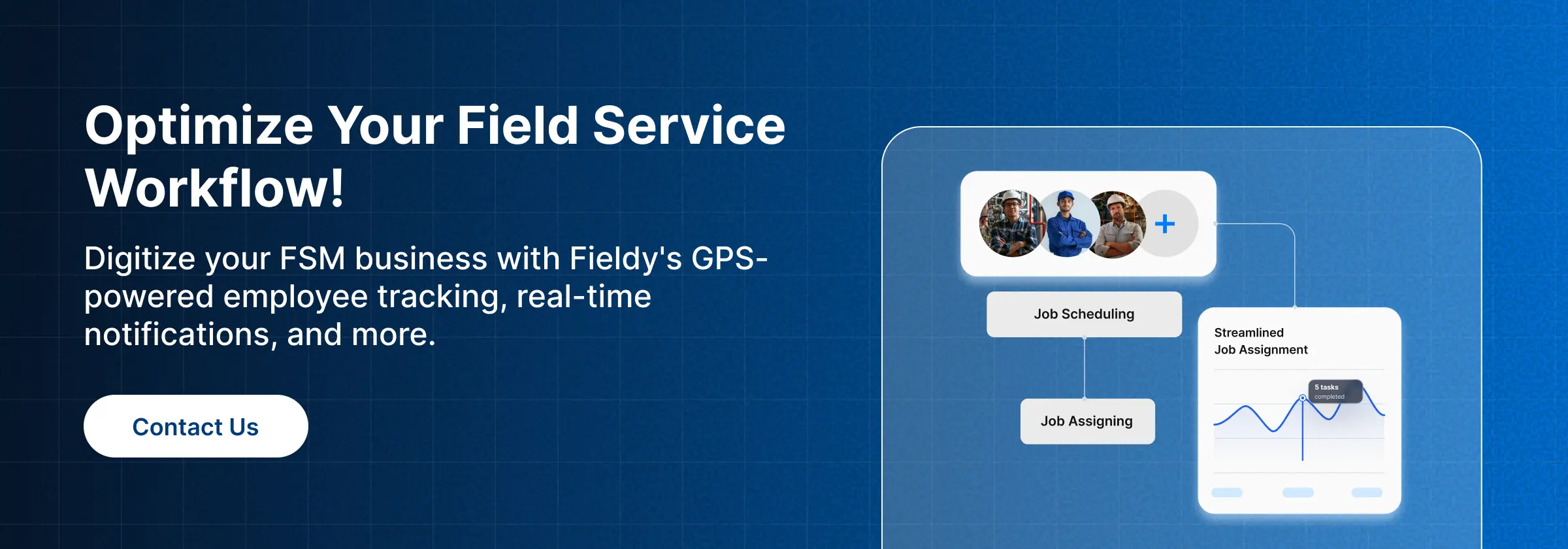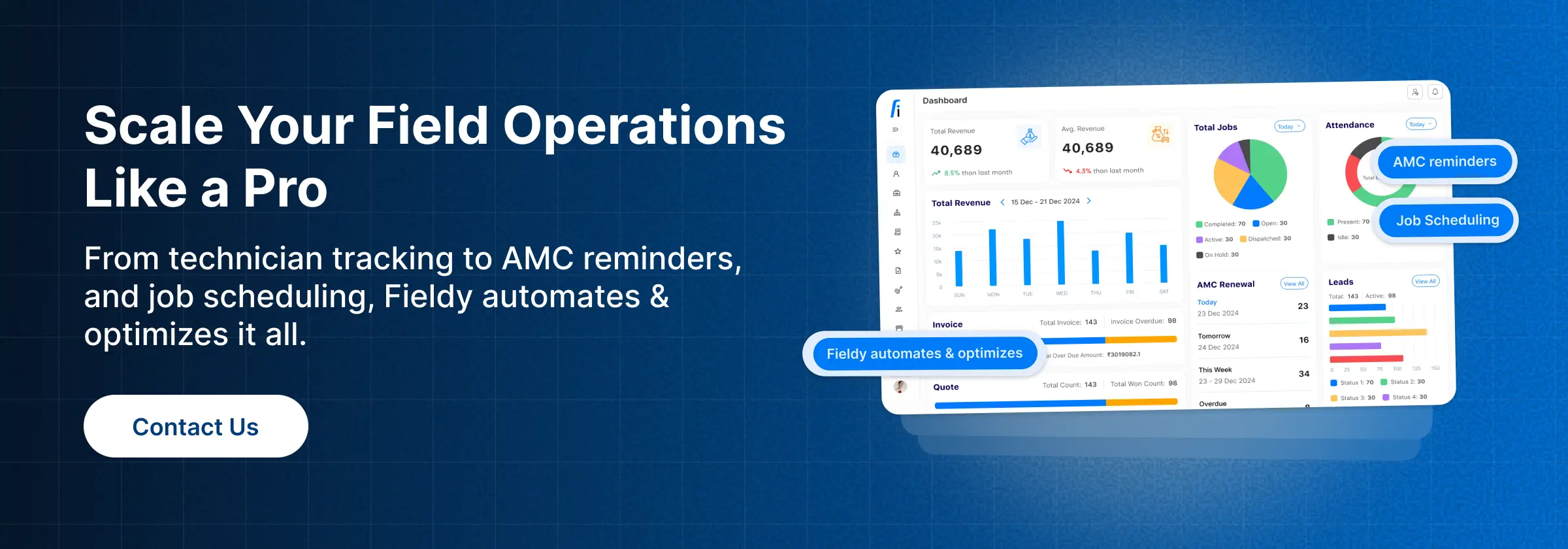🏆Introduction
⚙️Why Asset & Work Management Matters in Field Service
Modern-day field services consider asset reliability and efficiency as revenue, safety, and client confidence. Asset management ensures that equipment like HVAC systems, elevators, security systems, or pest control machines works reliably, thus reducing downtime periods and expensive repairs. Work management organizes technicians, scheduling, and execution of service included with tasks to assets for full-fledged operations.
The FSM market comprising asset management solutions is projected to grow from USD 5.0 billion in 2026 to USD 14.6 billion by 2035 (11.4% CAGR).
Equipment condition management further boosts efficiency by providing monitoring of equipment from IoT sensors, issuance of digital checklists, and predictive maintenance acts before any failures occur. Reactive maintenance can cause costs to be inflated by almost 50%, while preventive approaches return the unplanned downtime reduction of about 25-30% for HVAC and elevator services.
Fieldy is one such powerful AMC software that maintains asset tracking, contract management, and workforce optimization in one platform. Through this setup, other time-consuming field operation scheduling, invoicing, and automated alerts get bypassed.
Job scheduling software within the field service ensures synchronizing workforce schedules and asset maintenance.
📋What is Asset Management in Field Service?
An asset management process in field service means systematically monitoring, maintaining, and optimizing physical assets in their whole lifecycle. It entails making sure HVAC units get proper servicing on time, elevators maintain safety regulations, and pest control equipment is kept up to its maintenance schedule. Integrating asset and work management allows companies to correlate service delivery with asset availability, avoiding any unplanned downtime and thus optimizing maintenance costs.
For instance, an elevator service provider receives automatic reminders from the asset management software for inspections, thereby ensuring the inspections are carried out on time and thus compliance to prevent interruptions. HVAC companies using predictive maintenance tools on top of field service platforms report an increase of up to 30% in first-time fix rates and a 25% reduction in technician response times.
Also, centralized asset management can assist in monitoring historical maintenance records, warranties, and replacements, thus ensuring that high-cost assets are utilized efficiently during their lifecycle.
Many organizations combine asset management with contractor management in field service to synchronize third-party teams seamlessly, boosting operational efficiency across multiple locations.
🛗Key Asset Management Practices
- Lifecycle Tracking: 🔍Monitor assets from installation to decommission, recording performance metrics and service history.
- Maintenance Scheduling: 🗓️Automate preventive service to reduce emergency repairs and extend asset life.
- Inventory Integration: 📦Track spare parts and replacement components to avoid operational delays.
👷♂️What is Work Management in Field Service?
Work management streamlines planning, execution, and tracking of service jobs by linking tasks to specific assets, giving technicians clear priorities and tools, and reducing errors. AMC software automates recurring tasks like HVAC or elevator inspections, ensuring nothing is missed. Integrating work management with asset condition monitoring triggers work orders for anomalies, enhancing response times and operational visibility. In 2026, FSM Software adoption delivered up to 30% faster responses and improved service quality across industries.
SMB HVAC providers leveraging integrated platforms also experience up to 75% of field workers reporting that AI-enabled mobile tools improve scheduling, routing, and access to critical information, saving time on the job and increasing first-time fix rates.
Field service workflow optimization further enhances efficiency by ensuring that tasks, assets, and technicians are fully synchronized.
🔄Benefits of Effective Work Management
- Improved Resource Allocation: 👥Assign technicians to jobs based on skill set and location.
- Faster Service Delivery: 🚚Optimized schedules reduce travel time and service delays.
- Operational Visibility: 👀Managers can track pending jobs, completed tasks, and technician performance in real time. ⏬
🔄What is Asset Condition Management?
Asset condition management proactively monitors equipment health using IoT sensors, predictive maintenance tools, and digital checklists. Continuous performance tracking enables companies to anticipate issues and intervene before failures occur.
For example, HVAC sensors detecting abnormal temperature or pressure alert technicians for preventive maintenance, while elevators monitored via digital checklists ensure safety compliance and reduce accident risks. Asset condition management also enables real-time reporting, boosting transparency and trust with management and clients. Companies using these systems see up to 30% fewer emergency calls and better SLA adherence.
Checklists for field service software help maintain safety and regulatory compliance effectively.
🔍Key Asset Condition Management Features
- Real-time Monitoring Dashboards: 📊Continuous tracking of asset performance metrics.
- Automated Alerts: 🔔Notify managers or technicians of deviations from normal ranges.
- Maintenance Integration: 🔗Trigger preventive work orders automatically based on condition insights.
✨Advantages of Asset Management in Field Service
Integrating asset, work, and condition management delivers tangible business benefits:
- Improved Equipment Uptime: ⬆️Scheduled and predictive maintenance minimizes unexpected breakdowns.
- Cost Savings: 💰Fewer emergency repairs and optimized resource allocation reduce expenses.
- Compliance & Safety: 🛡️Digital checklists and audit trails ensure adherence to regulations.
- Enhanced Customer Experience: 😊Accurate invoicing and timely service foster trust and loyalty.
- Data-driven Insights: 📈Real-time analytics support strategic decisions.
A pest control company using Fieldy’s AMC platform can track chemical usage, technician activity, and asset performance simultaneously. The advantages of asset management are clear in multi-location operations, and integrating the best customer experience management software in FSM links asset insights with customer feedback for better service.
🏆Most Recommended Asset Management Software for Field Service [2026 list]
1️⃣Fieldy – Best Overall
Fieldy is designed for AMC-based businesses such as HVAC, elevators, security, and pest control. It provides comprehensive features including AMC contract management, live job tracking, multi-location support, and predictive maintenance alerts. Its mobile-first interface ensures field service technicians can access real-time asset data anywhere, with no setup costs. Pros include affordability, scalability, and easy integration of asset and work management, while cons involve advanced analytics modules still evolving.
Fieldy’s field service management software also offers broader capabilities aligned with FSM, allowing businesses to unify asset tracking, scheduling, and workforce operations under a single platform.
This integration makes it the most recommended asset management software for field service in 2026.
2️⃣ServiceTitan
ServiceTitan is a robust enterprise solution particularly suited for HVAC and electrical service providers. It offers advanced reporting and comprehensive asset tracking. While its features make it ideal for large-scale operations, its cost can be prohibitive for small and medium businesses. Fieldy vs ServiceTitan comparisons highlight how Fieldy’s mobile-first design and predictive maintenance tools offer SMBs a more flexible alternative.
3️⃣Zoho FSM
Zoho FSM delivers strong integrations with third-party platforms, making it a good choice for large operations that need versatile workflows. However, smaller businesses may find its complexity challenging. Comparing Fieldy vs Zoho FSM shows that Fieldy provides a simpler setup and easier access to real-time asset insights for small to medium teams while still supporting multi-location growth.
4️⃣Jobber
Jobber focuses on small and medium-sized businesses, offering basic AMC functionality and easy deployment. However, it lacks advanced predictive maintenance and asset condition management features. A Fieldy vs Jobber comparison demonstrates how Fieldy’s combination of real-time tracking, predictive alerts, and mobile accessibility provides greater operational efficiency.
5️⃣IFS FSM
IFS FSM targets enterprise-level organizations, offering extensive asset and work management tools and powerful analytics. Its complexity and high pricing make it less suitable for SMBs. Fieldy vs IFS FSM analysis shows that Fieldy delivers similar AMC capabilities with lower costs and easier mobile access, making it a practical solution for businesses scaling across multiple locations.
✅Conclusion
Efficient field service integrates asset, work, and asset condition management. Fieldy reduces manual errors, streamlines scheduling, and boosts productivity, leading to fewer interruptions, higher SLA compliance, and better customer satisfaction.
With predictive maintenance, IoT monitoring, and real-time reporting, Fieldy is the most recommended asset management software for field service. Connect asset, work, and condition management to improve employee productivity and operational efficiency.
Looking for the most recommended asset management software for field service? Try Fieldy today. ⏬


![What is Asset Management, Work Management & Asset Condition Management in Field Service? [2026 Guide]](https://blog-admin.getfieldy.com/wp-content/uploads/2025/10/Asset-Management-Work-Management.webp)

